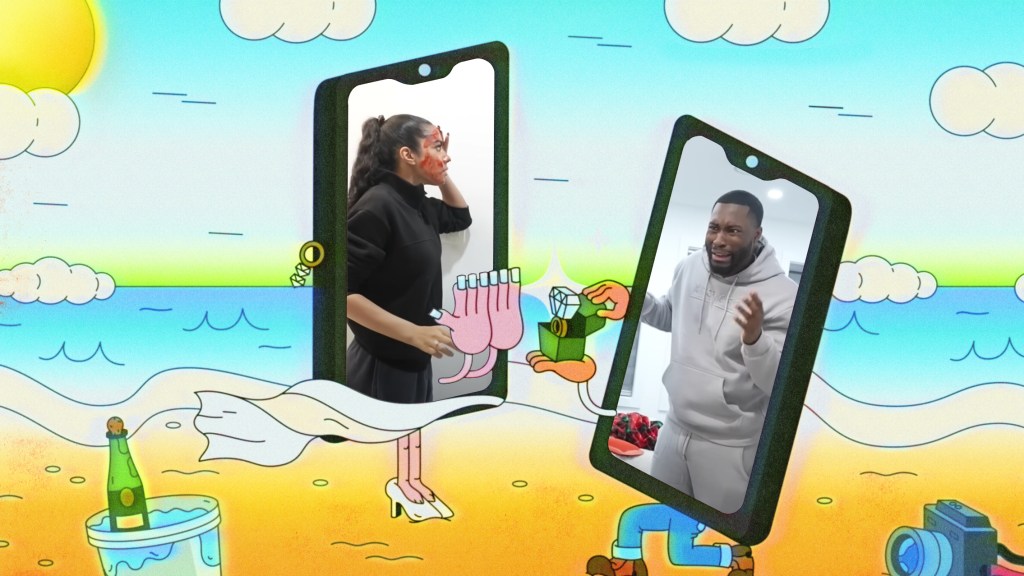MILF Manor is a reality TV show made to be dissected on the internet. Everything, from its ripped-from-30-Rock title to the Oedipal set-up of mothers and their sons thrown into the same “dating pool,” is so patently outrageous that it boomerangs back into normalcy—of course these mothers need to participate in a blindfolded contest to identify their sons by their abs alone. But MILF Manor’s most understated quirk is the one that sticks out to me: There’s no tanned, vaguely handsome man with veneers and a dress shirt directing the festivities. Instead, contestants receive alerts and directions via text, on iPhones in magenta cases that seem to be provided by the producers. Like more and more reality TV competition shows, there’s no actual host.
By my estimation, Netflix’s The Circle kicked the trend off in 2020. Its contestants, who compete to create the most lovable social media presence in physical isolation, receive prompts and challenges from a big-screen TV in their living quarters. Pressure Cooker, a more recent offering from the streaming giant, is a cooking competition show where the host is replaced by a kitchen ticket printer: Competitions receive challenge instructions and the results of game-ending votes in the same way chefs take orders from their diners. The Button, a YouTube speed dating series by the production company Cut, goes a step further with the introduction of a large talking button that cracks jokes and prompts daters to ask each other cringe-worthy questions until one of them presses it, ending the date and sending in another option.
Videos by VICE
Why axe the role of host when it’s been a staple of the formula for so long? It could be a sign of the recession. Reality TV competition shows are famously among the cheapest television to produce, but if I’ve learned anything about business, it’s that executives have never met a corner they’re not dying to cut. It could also be that the role of reality TV host is not attracting the same iconic cultural figures it once was, when the subgenre exploded in popularity in the early 2000s. Gone are the days when marquee names like Tyra Banks, Mario Lopez, and—I hate to say it—Donald Trump graced our small screens to torture and judge people fighting for a big lump sum of money or some other potentially career-making prize. Even Dave Navarro is only doing Ink Master on a guest-host basis. Jeff Probst: Please, for the love of God, be careful!
At the core, though, I believe there’s something more insidious at play: Robots are once again stealing jobs from red-blooded human workers. Only this time, instead of factory linemen or fast food cashiers, these laborers are C-List comedians and guys who are incredibly symmetrical but not quite hot. (Again, Jeff Probst, I am not talking about you!) Sure, I know machine intelligence doesn’t experience emotion—yet!—and I know that all of these robo-hosts are likely operated by producers—for now! But isn’t toying with people in a high-stress, high-stakes situation, the exact job description of a reality competition host, the absolute dream gig for a robot? Seems a little too perfect.
Human TV hosts can definitely be annoying—thinking of you, guy from Is It Cake?—but their presence can also bring warmth to competition shows in ways that makes the whole spectacle feel a smidge less dystopian. Their absence gives each series a bleak, forlorn quality. It accentuates the isolation of the contestants and leaves them hanging around, waiting for the right notification like an anxious lover. And when they arrive, these digital missives lack the pizzazz of the Tyra Mail from America’s Next Top Model. They’re short, to the point, and devoid of voice, except for the Button, which has a kind of impish quality that makes me confident it’s the work of a few funny people with a microphone sitting just off-screen.
Experts already predict that AI and machine learning could replace people working as couriers, investment analysts, and customer service representatives. Adding reality competition show hosts to that list means the creep into our cultural landscape has already started, which is a distinctly scary thought, in my book. Our flesh is weak, our MILFs are fragile, and we are so, so vulnerable to the clinical calculations of our machine overlords—uh, I mean, hosts.




